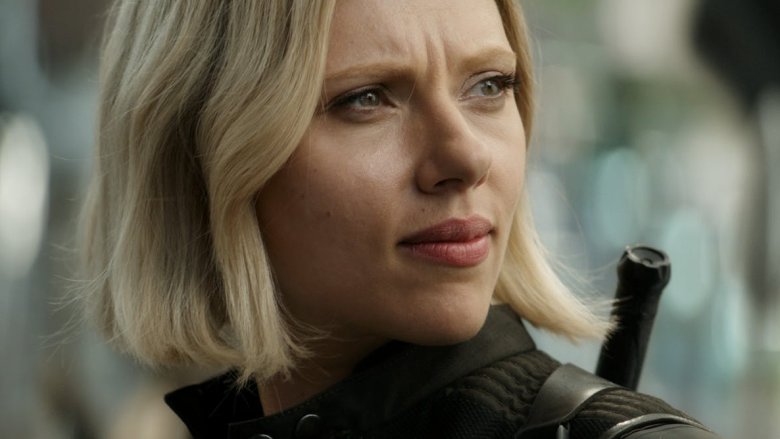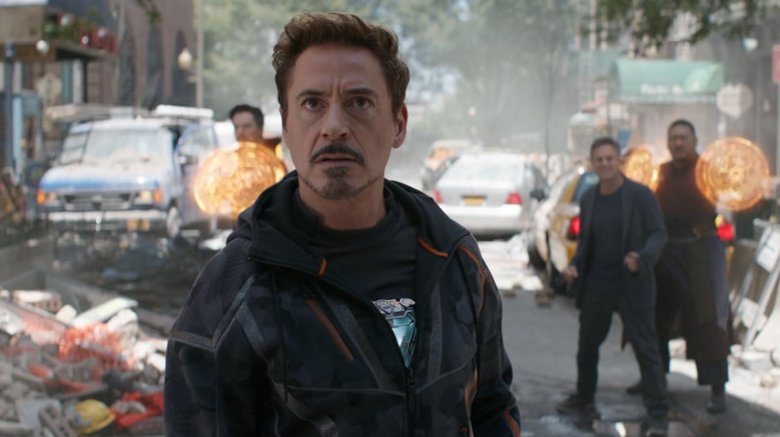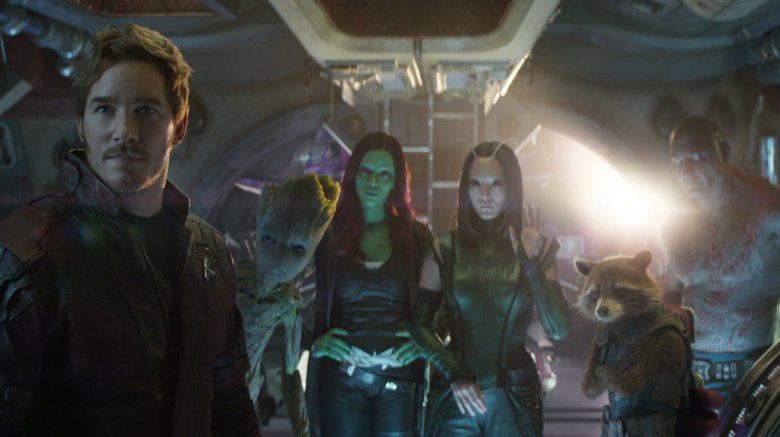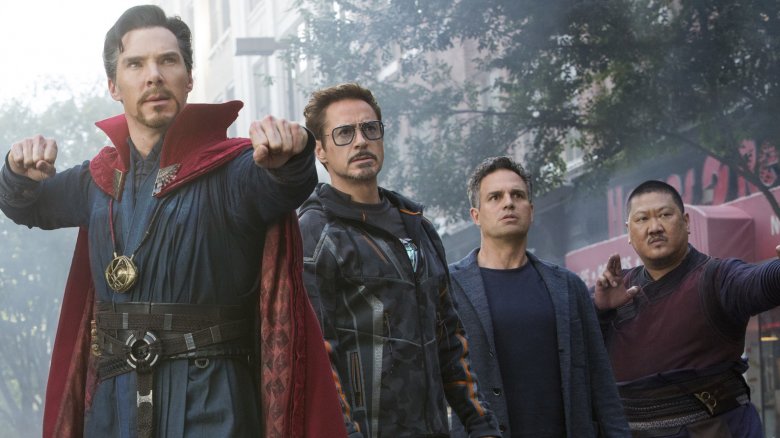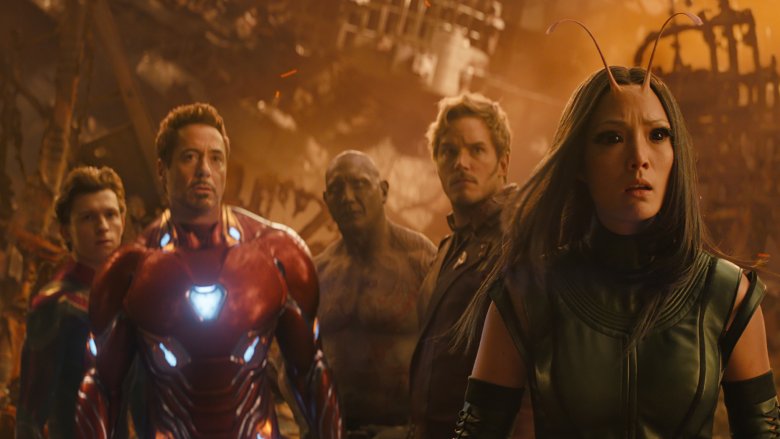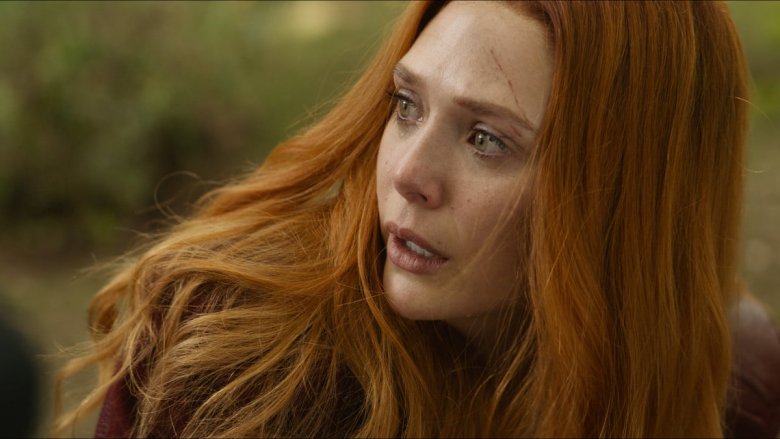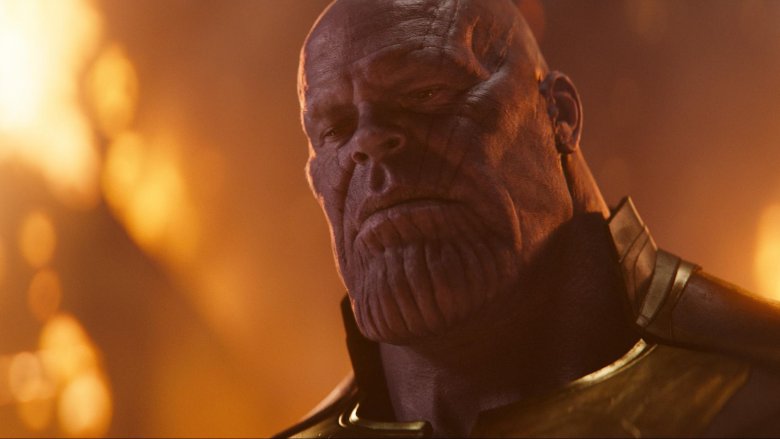What Critics Didn't Like About Avengers: Infinity War
In the months leading up to the launch of Avengers: Infinity War, Marvel fans heard just about every dazzling descriptor for the supersized superhero extravaganza: the "culmination of over a decade of blood, sweat, and tears shed by Marvel Studios," the "single film the entire Marvel Cinematic Universe as we know it has led up to," the "two-and-a-half-hour-long spectacle so incredible, it'll blow your eyelashes clean off your face and leave you without a puff of air in your lungs or an idea of what just happened in your head." (Okay, maybe not that last one, but you get the gist.)
Simply put, Avengers: Infinity War was intended to be two things: massive and magical. While it definitely delivered on the first front — boasting a cast as full as you are after a Thanksgiving meal, with nearly every Marvel hero featured in one way or another, and early box office projections predicting it would earn as much as $500 million worldwide in its first weekend out — some viewers weren't completely sold when it came to the second.
Reviews of Avengers: Infinity War have been predominantly positive (one even stamped the newest Marvel flick as the "biggest, most ambitious piece of storytelling in the studio's 10 years of existence"), but a noticeable subsection of movie critics had less cheery and chipper things to say. You've heard the warm and fuzzy reactions to the pic; now find out what critics didn't like about Avengers: Infinity War.
Too focused on the future
Planning ahead is a positive habit to practice, and when it comes to franchises as massive as the Marvel Studios pantheon, having a years-long game plan mapped out before the first step is even taken is a must. (Hey, weaving together the pieces of 18 separate films to make one mega-movie quilt takes a lot of forethought.) Unfortunately, too much organization before the fact can actually be more detrimental than it is beneficial. Spend more time than necessary focusing on what will happen next, and nothing ever will.
In the case of Avengers: Infinity War, certain critics felt it was the classic watched pot that doesn't fully boil, falling victim to overzealous preparedness by dedicating more time and energy setting up what would come next in Avengers 4 than telling its own story. For these folks, the film felt incomplete and underdone.
Scott Mendelsohn of Forbes wrote that Infinity War is only "half a movie," and that it "devotes so much time being a prequel to next year's Avengers that it mostly fails to be a sequel to what has come before."
Digital Spy duo Rose Fletcher and Hugh Armitage agreed, stating in their review that Avengers: Infinity War felt both "a bit rushed," even with its 156-minute runtime, and "like a setup for Avengers 4, which will now be the new 'biggest movie event of the century.'" They added, "Despite trying to ditch the 'Part 1' tag, this remains very much half of an eventual whole."
Ups and downs
Roller coasters of the butterflies-in-your-belly, awesome-day-at-Disneyland variety? Good. Roller coasters of any other kind? Decidedly the opposite. Marvel movies have gained a reputation for being unpredictable — that death we didn't see coming! that battle to the bitter end! — and quirky in their own regard, particularly the recent MCU-altering installment Thor: Ragnarok. A careful balance of larger-than-life cinematics, sentiments that sometimes tip over to the somber side, and genuine humor make Marvel's films fun to watch, something the studio's creatives have achieved in nearly all series installments so far.
Some watching Avengers: Infinity War, however, felt directors Joe and Anthony Russo failed to find that state of equilibrium and instead disregarded pacing and constantly ricocheted between wanting the audience to take the story seriously and encouraging them to laugh out loud at its one-liners.
"There's no pacing in Avengers: Infinity War," TIME Magazine critic Stephanie Zacharek wrote. "Tucked amid the story's numerous operatic sacrifices ... there are jokes folded in, lots of them. The Marvel Universe is not all serious Infinity Stones and stuff. It also wants us to laugh — but it will decide when it's okay to poke fun, not you ... Even when you're supposed to be having fun, you're really following a very strict set of rules."
Blake Crane of Film Pulse picked up on the jarring flips in tone as well, writing that the "weird juxtapositions of quips with carnage ... throw off the tone."
Action, action, action
No one walks into a theater, their ticket for the latest Marvel film in hand, expecting an experience akin to sitting on the couch and knitting a pastel pink wool sweater while their grandmother bakes holiday cookies in the kitchen. No, seeing an MCU flick has historically been like eating a meal of fresh-baked battles with a side of intense confrontation fries washed down with a sweet just-desserts shake. Marvel films are loud, proud, and all about the action — and fans have largely scarfed down that cinematic goodness with a smile.
A major element of Avengers: Infinity War that some critics didn't like, however, was how it handled its action sequences. Instead of the high-octane, fling-your-head-back-in-amazement scenes Marvel enthusiasts have become accustomed to, Infinity War dished up scenes that tasted like burnt superhero movie boilerplate for a few viewers.
The New York Times film critic A.O. Scott called the action in Avengers: Infinity War "especially tedious and predictable," with the heroes and villains "fight[ing] in the usual way," and lamented the money Marvel spent on the "noisy, bloated spectacles of combat" that lacked originality and imagination.
Gary Thompson of Philadelphia Daily News drew an acerbic comparison in likening Infinity War's action scene to ones featured in a major box office bomb: "Action sequences pass by in an undistinguished blur — an attack on Wakanda looks a lot like an outtake from 2016's Matt Damon flop Great Wall." Ouch.
A crowded canvas
Members of multi-sibling families can agree: It's difficult to get the attention you deserve when the source giving you that notice has others to attend to. Such was a point of contention for a number of critics watching Avengers: Infinity War, who argued that the film didn't appropriately or astutely split its time between its many, many characters, and because of it, none were interesting or impactful.
Marvel films work best when "they have time to devote to a manageable range of characters," critic Gary Thompson contended in his review. "Infinity War contains just about everybody ... as if the sheer volume of Marvel characters would give the movie dramatic force. The opposite occurs." Because of its stuffed-with-heroes status, Avengers: Infinity War felt to Thompson like it was overflowing, its characters both "crowding out emotional investment" and failing to carry "much screen impact."
Similarly, Luke Buckmaster of The Daily Review/Crikey didn't like that the Russo Brothers mistook "quality for quantity" by packing the film with "76 comic book characters" — none of which were given the care they needed to be the captivating crusaders fans know them as. "None are well-written. Most evoke memories of previous films in which their adventures were treated with a little (sometimes a lot) more care," Buckmaster said of Infinity War's heroes and villains. "The backstories are virtually non-existent and the characterizations thin; this is like a soap opera where you're supposed to remember previous episodes."
Too much of a good thing
Everyone knows how the saying goes: Less is more. (Unless, of course, the thing you're debating having less of is ice cream or vacation days, but we digress.) Avengers: Infinity War took a different route, adopting a "more is more" mentality. For some fans, that over-the-top vibe was everything they wanted, but for others, it was an arduous nightmare.
"[Infinity War is] epic, sure, but if anything it's too epic. The characters are too many, the action too massive, the stakes too high, the players too powerful," Digital Spy's Rose Fletcher and Hugh Armitage wrote.
World of Reel's Jordan Ruimy also felt the "over-the-topness never quite subside[d]," and Infinity War wound up being "too much of everything." Film Pulse critic Blake Crane wrote that the pic's "the bigger, the better" approach made for a "collection of moments that ... fail[ed] to completely coalesce into a cohesive 150-minute epic." For Adam Graham of The Detroit News, the film was "Infinity overload," a "superhero surplus with too many heroes and not enough screen ... too much action, too much everything." But Village Voice critic Bilge Ebiri perhaps spoke for every critic who didn't like Avengers: Infinity War's profligacy: "Infinity War is exhausting. Exhausting."
After watching two and a half hours of CGI-fied fights to keep the fate of the galaxy out of Thanos' Infinity Gauntlet-adorned hands, these critics became desensitized to the overblown world Marvel built.
Is it even a movie?
There's rarely a time when something potentially groundbreaking happens in the entertainment world that a tiny voice in our head doesn't wonder if it's all just a big publicity stunt, or if someone, somewhere is pulling magic strings and pandering to their audience. But surely Avengers: Infinity War was immune to such speculation, right? Though Marvel fans and most casual moviegoers would wholeheartedly agree, some critics answered with a straight-faced "no."
What a number of critics didn't like about Avengers: Infinity War was that it came across less like an actual film and more like an "immutable fact of life," an eventuality that no one can escape, and one giant advertisement.
"This film ... was never meant to be viewed or judged in isolation. In that respect, it shouldn't really be thought of as a movie at all," wrote The New York Times' A.O. Scott. Another critic expressed the same sentiment: "Avengers: Infinity War isn't really anything you could call a movie — it's more of a fulfillment center."
Luke Buckmaster held no bars in slamming Avengers: Infinity War, denouncing it as nothing more than an oversized promotion for Marvel Studios and the MCU. "Avengers: Infinity War isn't a movie: it's advertising and brand management on an unprecedented scale," his review reads in part. "The producers chuckle, examining the ledgers. 'Just give us your money, be grateful for what you get, and keep coming back for more.'"
